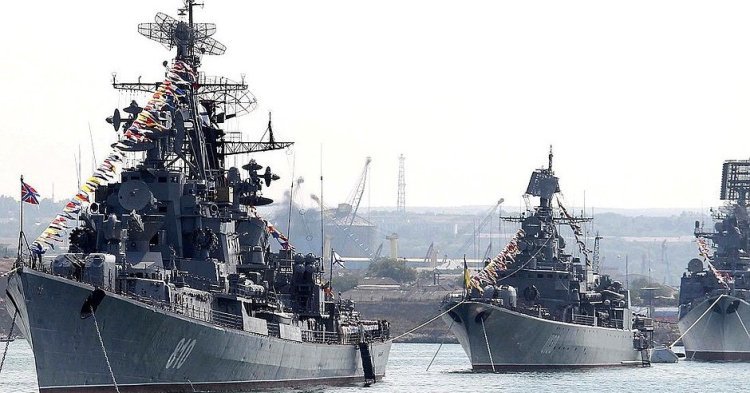The Russian Navy opened fire and captured three Ukrainian vessels and 24 crew members on the 25th of November, citing that Ukraine was in their waters illegally because Russia had closed off an area of the strait for shipping. However, Ukraine responded by declaring once more that Crimea belongs to their country, and that Russia’s act is a breach of international maritime law because the Black Sea is proclaimed free to all for shipping.
Ukraine continued to further fan the flames of conflict by declaring martial law for 30 days and declaring that it will continue to send navy ships through the Kerch Strait to retain control over the Sea of Azov, connected to the strait that separates Crimea from Russia.
How will this affect Ukraine’s path towards EU membership?
Ever since Ukraine’s revolution in 2014, motivated by the will to put an end to Russian domination over Ukraine’s political sphere, the country has followed a path determined towards integration into the European Union and NATO. This development began with the ousting of Kremlin-backed Ukrainian President Viktor Yanukovych, who had rejected EU association agreements in favour of closer ties with Russia.
Succeeded by Petro Poroshenko, Ukraine began to develop a policy of openness towards EU with the signing of the Ukraine-European Union Association Agreement in 2014, with Poroshenko stating that "European and Euro-Atlantic integration is a path for Ukraine that has no alternatives.”
At the time, Russian President Vladimir Putin responded to the agreement by saying that “making Ukraine choose between Russia and the EU would split it in two.”
And it did.
Four years later, the chronology of events in Ukraine has divided the country in half as Putin had foreshadowed, with the West being pro-European and the East being pro-Russian. 10,000 dead in the ongoing civil war in Crimea and Donbass, an essential battle between the East and the West, proving that the Iron Curtain continues to exist to this day.
Ukraine’s government made a statement on the 24th of August this year while celebrating the 27th anniversary of its independence from the Soviet Union in 1991 following the dissolution of the USSR. In the statement, President Poroshenko reaffirmed Ukraine’s commitment towards EU integration, acknowledging that becoming a member would provide ”a 100% guarantee of our independence.”
He continued by characterising Russia’s meddling through Kremlin-orchestrated attacks for terrorising Ukraine as a part of Russia’s bigger plan to dismantle the European Union.
“The Russian war against Ukraine is part of the Kremlin’s plan to ruin the European Union and NATO. Our warriors in the east defend security and prosperity not only in Ukraine, but also throughout Europe. So we do not go to the European Union and NATO empty-handed,” Poroshenko said. “Europe needs us as well, because without us the European Union will not become a completed project.”
Poroshenko and the Ukrainian Parliament have now put their words into action in defiance of continued Russian interference in their country. A bill was introduced into the parliament that will amend the Ukrainian constitution in terms of the country’s strategy towards achieving membership in the EU and NATO. The President proclaimed that by passing the amendments, the Parliament would confirm its intentions concerning the integration process.
The approval of the law draft on 23 November represented a step forward in Ukraine’s search for European identity. According to UAWire, it “solidifies the civic choice of the country’s citizens who give preference to their European identity.” In addition to this, the national security law that was signed at the end of July also confirmed the course for EU integration.
How the EU is reacting towards the recent escalation of conflict in Crimea
The European Union has condemned Russia’s actions but also urged Ukraine not to heighten the tension any further. German Chancellor Angela Merkel spoke at the third annual German-Ukrainian economic forum on 29 November, advising Ukraine to be “sensible” and utilise dialogue to de-escalate the ongoing tension.
Ukraine has urged the EU to enforce more sanctions towards Russia in response. A high-ranking European diplomat stated that “the issue (of sanctions) is still on the table. It’s among the options. But for the moment the priority is to encourage each side to de-escalate, to try to put out the fire.”
The Ukrainian Vice Prime Minister for European and Euro-Atlantic Integration, Ivanna Klympush-Tsintsadze, pressured EU and NATO to take action in an interview with Euronews.
“I would like to see European and NATO countries acting more promptly and being ready to react much faster. However we understand that this is the decision of many and it does take time.... That is a threat not for Ukraine only, this is a threat for European security. And unfortunately some European politicians prefer to turn a blind eye to this problem.”
The EU continues to be hesitant with regard to the escalation of tension, due to the fact that Russia is the EU’s fourth-largest trading partner, and the EU is Russia’s largest investor. In the recent years, trade between the two has dropped substantially as a result of the crisis in Ukraine, dropping by 44% between 2012 and 2016, or from €339 billion in 2012 to €191 billion in 2016.
Regardless of these EU-Russia relations, on 30 November the European Commission approved the disbursement of the first €500 million (of €1 billion available) of the Macro-Financial Assistance (MFA) programme to Ukraine, further affirming EU’s dedication to Ukraine’s path towards membership status. The EU has now provided €3.3 billion in macro-financial assistance towards Ukraine, making it the largest amount of financial aid towards any non-EU member state.
Valdis Dombrovskis, the Commission Vice-President responsible for the euro and Social Dialogue, reaffirmed EU efforts towards Ukraine in a statement after the meeting disbanded.
“The European Union has shown constant political and financial support to Ukraine. Today’s European Commission decision on disbursement comes at a crucial moment when Ukraine and its people face a new aggression from Russia and need to see solidarity from international partners. Such aggressive behaviour is not acceptable in today’s Europe.”
The future appears to be hopeful for Ukraine as the country gradually ascends towards European Union accession. However, this will be contingent on de-escalating the tension with Russia in a struggle of the East and the West. Putin and the Kremlin can no longer hold on to the remnants of Soviet power in the former communist states, and with the assistance of the European Union and NATO, Ukraine will prevail.


Follow the comments: |
|
